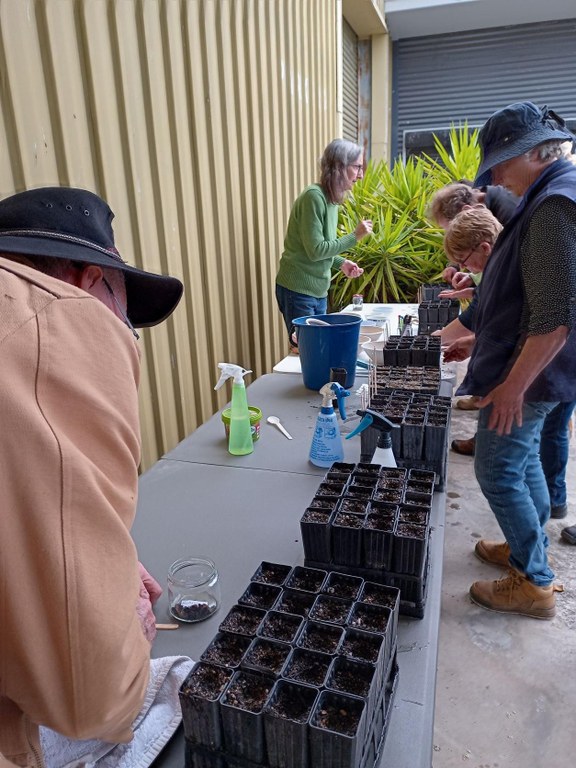
Learning the Art of Native Seed Collection and Propagation with Lyn Ellis
On Saturday 3 September, fourteen people gathered in Araluen for Upper Deua Catchment Landcare’s native seed collection and propagation workshop. “Our Saturday workshop delivered useful, practical advice and hands on techniques to give participants the knowledge needed to collect and propagate native species at home” said Cath Harrison, Upper Deua Landcare Community Liaison Officer.
Under the expert guidance of Lyn Ellis, participants were able to learn about the methods for gathering and planting their own seed, before potting up their own tray of natives to take home.
Lyn and her partner Murray ran a local native nursery near Mongarlowe for 20 years. Many windbreaks and plantings around the district were grown from their stock, with the nursery having a wonderful reputation for providing hardy tubestock for the Braidwood region.
While they no longer run the nursery, Lyn and Murray continue to offer advice on plant identification, and what to grow when, where and how - with the workshop on Saturday providing some valuable information.
Lyn kicked off with some tips for seed collection and storage, including making sure you have the right permission and licensing before heading out, as well as the value of sourcing local, clean seed, with good genetic diversity, to grow the healthiest stock adapted for your area.
The key to good collecting is always label, label, label, so you know what your seed is, where it’s from and when you picked it. Another good tip, to stop your seed going mouldy, is to dry it out thoroughly and place it in a glass jar with a little sachet of desiccant, before storing in a cool dark place.
Moving on from seed collection, Lyn went over the principles of propagation, the advantages of direct seeding, the art of watering and her favourite recipe for seed raising mix. She discussed how some seeds, like acacias, require pre-treatment before planting, either scratched with sandpaper, or covered in boiling water and soaked overnight, to crack the hard outer coating and kickstart germination.
Lyn also showed the group how seed size determines how deep to plant it. Fine ‘dust-like’ seeds, such as callistemons, barely need a sprinkle of sand, while larger or winged seed, like banksias and hakeas, need a good pinch of soil on top. Once planted, they then require ‘goldilocks’ watering - just enough to keep it damp, but not too much to wash the seed out of place.
After the demonstration, the group practiced planting their own trays, choosing from a range of local seeds and species suitable for growing along waterways. Ideally, some of the seedlings will be ready for an autumn planting along Araluen Creek.
“We all left with a sense of enthusiasm and a tray of freshly planted native seeds to grow for revegetation. From a community perspective, it provides groups like Upper Deua Catchment Landcare the opportunity to grow our own tubestock for restoration projects into the future” said Cath Harrison.
Although the bulk of the Araluen Creek Restoration Project is large scale earthworks and fencing to stabilize the creek, this propagation workshop was part of a series run in collaboration with the Upper Shoalhaven Landcare Council on holistic creek management - from understanding geology and erosion, to riparian monitoring, weed control and revegetation efforts.
“Through these workshops we will also know about how to grow plants to help maintain the banks and support the insects and animals that are the life of the creek” said Larry O’Loughlin, Secretary of the Upper Shoalhaven Landcare Council and proud planter of a tray of Banksia marginata (Silver Banksia) and Eucalyptus ovata (Swamp Gums) on the day.
Funded by the Landcare Led Bushfire Recovery Project in support of the Australian Government’s Bushfire Recovery Program for Wildlife and their Habitat, the goal of the workshop was to give training on how to propagate local species for local projects.
Penny Hayman, Secretary of the Upper Deua Catchment Landcare, found the workshop an eye-opener. “Normally my focus is on pulling things up, like the weeds, not on growing and planting... Lyn provided such a great step-through of how we can actually do it ourselves locally and make it succeed.”
Ultimately, a key message from Lyn is “to be observant and opportunistic when collecting seed. Experiment with propagating and learn as you go.”
If you would like copies of hand-outs and information from the workshop please contact upper.shoalhaven@gmail.com




